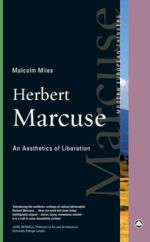 MALCOLM MILES
MALCOLM MILESHERBERT MARCUSE
An Aesthetic of Liberation
Pluto Press, 5 dec 2011
When capitalism is clearly catastrophically out of control and its excesses cannot be sustained socially or ecologically, the ideas of Herbert Marcuse become as relevant as they were in the 1960s. This is the first English introduction to Marcuse to be published for decades, and deals specifically with his aesthetic theories and their relation to a critical theory of society.
Although Marcuse is best known as a critic of consumer society, epitomised in the classic One-Dimensional Man, Malcolm Miles provides an insight into how Marcuse's aesthetic theories evolved within his broader attitudes, from his anxiety at the rise of fascism in the 1930s through heady optimism of the 1960s, to acceptance in the 1970s that radical art becomes an invaluable progressive force when political change has become deadlocked.
Marcuse's aesthetics of liberation, in which art assumes a primary role in interrupting the operation of capitalism, made him a key figure for the student movement in the 1960s. As diverse forms of resistance rise once more, a new generation of students, scholars and activists will find Marcuse’s radical theory essential to their struggle.
Malcolm Miles is Professor of Cultural Theory in the School of Architecture, Design and Environment at the University of Plymouth. He is the author of Urban Utopias: The Built and Social Architectures of Alternative Settlements (2008), Cities & Cultures (2007), Urban Avant-Gardes: Art, Architecture & Change (2004), and Art, Space & the City (1997). He is co-editor of the Routledge Critical Introductions to Urbanism series.